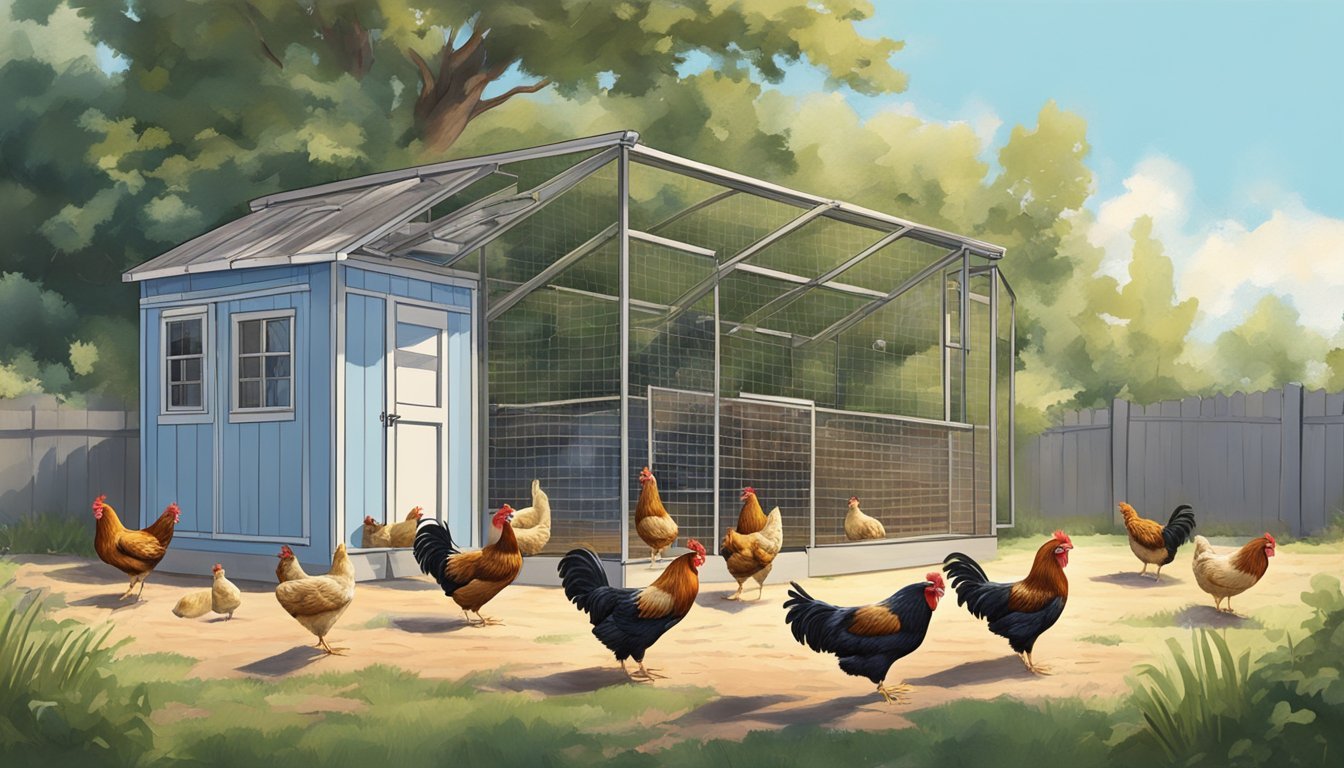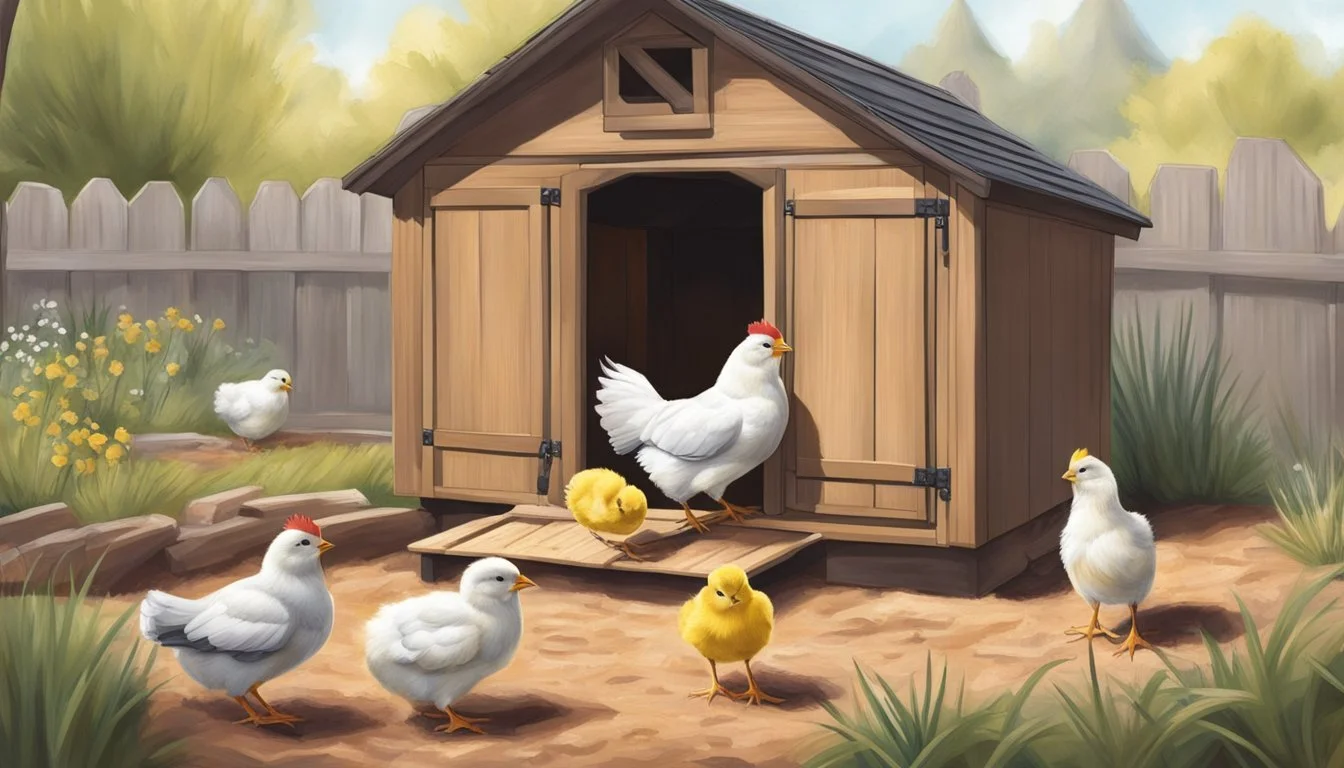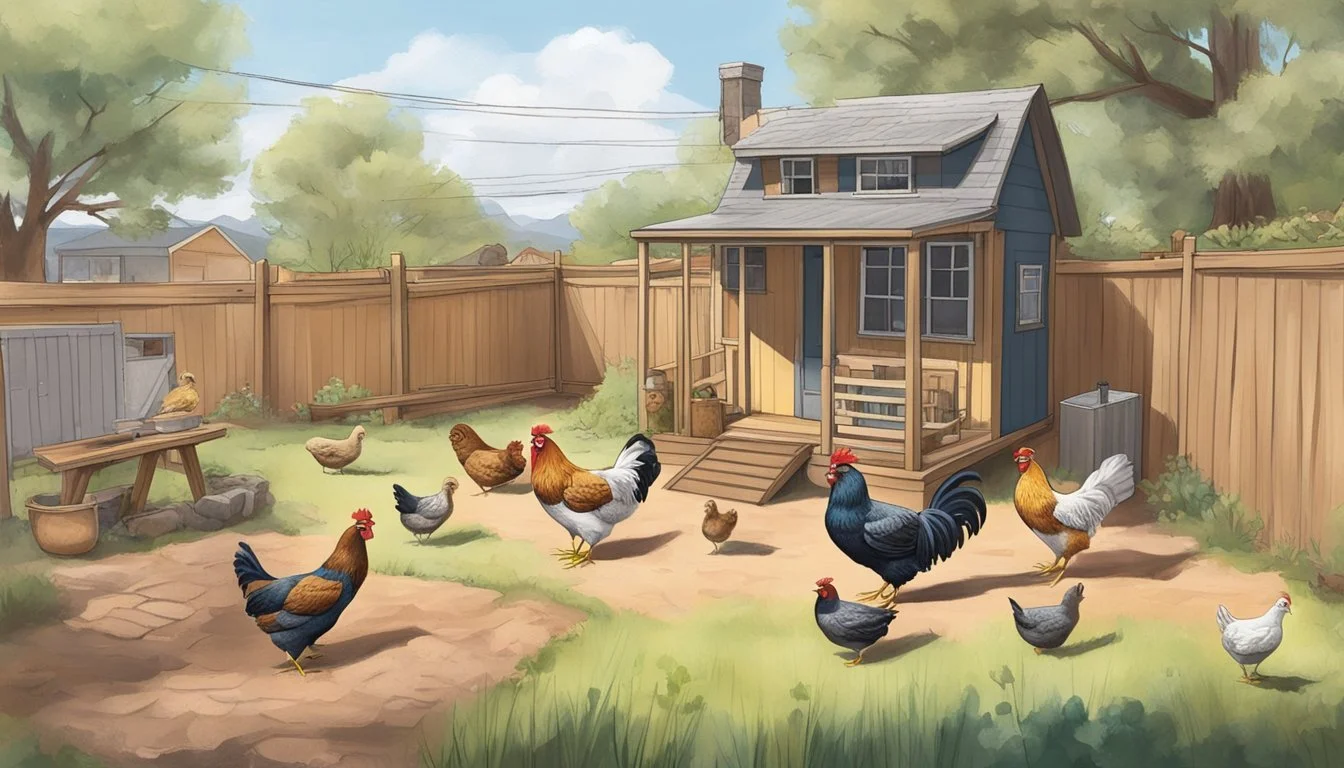Raising Backyard Chickens in Flagstaff, AZ
Essential Tips for a Thriving Flock
Raising backyard chickens has become an increasingly popular practice in Flagstaff, Arizona, combining sustainability with the joy of caring for animals. The city's guidelines permit residents to keep a range of small livestock animals, including chickens, in their backyards. This initiative supports a sustainable lifestyle, providing families with a fresh source of eggs, and the opportunity to educate children about animal care and food sources.
In Flagstaff, the rules for keeping backyard chickens are designed to balance urban living with the benefits of small-scale agriculture. Aside from chickens, residents can also maintain ducks, rabbits, miniature goats, and even bees without the need for special permits. These guidelines ensure that any potential issues such as noise and cleanliness are managed, creating a harmonious environment for both residents and their animals.
Potential chicken owners in Flagstaff should familiarize themselves with the specific legal requirements and best practices for raising poultry. These include understanding the proper setup for coops, ensuring adequate space and nutrition for the chickens, and recognizing the importance of maintaining cleanliness to discourage predators and pests. As the interest in backyard chickens grows, Flagstaff continues to be a supportive community for this rewarding endeavor.
Understanding Local Regulations
In Flagstaff, Arizona, individuals interested in raising backyard chickens must navigate a series of local regulations, ensuring compliance with city ordinances, permit requirements, and zoning rules.
Flagstaff City Ordinances
Flagstaff's city ordinances were revised on May 19, 2020, introducing the need for a permit to keep livestock within residential zones, excluding estate and rural residential areas. The city allows residents to keep small livestock animals, including chickens, ducks, rabbits, miniature goats, and bees on residential or educational properties. Homeowners should be aware that Flagstaff permits up to 25 hens, with the stipulation that the chicken coops are situated at least 50 feet from any residential dwellings to avoid issues with neighbors.
Coop Permit Requirements
Before constructing a chicken coop, residents must apply for a permit through the City of Flagstaff. The permitting process is crucial to ensure that all structures intended for livestock keeping, including chicken coops, adhere to safety standards and local codes. Applicants are encouraged to contact the city's planning office via email or phone for guidance on the permitting process.
Zoning and Homeowners' Associations
When considering raising chickens, it's imperative to examine local zoning laws and homeowner association (HOA) rules. Zoning regulations can vary widely, influencing where chicken coops may be located on a property. Additionally, HOAs may have specific restrictions or guidelines that go beyond city ordinances. It is recommended for homeowners to review their HOA agreements and consult with zoning officials to prevent potential disputes and ensure alignment with all community standards.
Choosing the Right Chicken Breed
When selecting chickens for a backyard flock in Flagstaff, Arizona, it's crucial to consider breeds adapted to the local climate, their purpose for egg laying or meat, and general popularity among small-scale poultry enthusiasts.
Climate-Adapted Breeds for Flagstaff
Flagstaff's climate is known for its cool temperatures and can experience heavy snowfall in the winter. Choosing chicken breeds that can thrive in such conditions is essential. Australorps and Wyandottes are two breeds known for their hardiness in colder weather. Australorps, originally from Australia, have dense feathers that help them retain heat. Similarly, Wyandottes are sturdy and have a thick plumage that protects them from the cold. Both breeds are capable of withstanding Flagstaff's colder temperatures while remaining productive.
Egg Laying vs. Meat Breeds
Backyard chicken owners typically prioritize egg production or meat yield when selecting their breeds. Breeds like Rhode Island Reds, Leghorns, and Australorps are excellent choices for those focusing on egg production. For instance, Leghorns are prolific layers, known to lay up to 280 white eggs annually. To highlight:
For Egg Laying:
Rhode Island Reds: Approximately 200 brown eggs per year
Australorps: Up to 250 brown eggs per year
Leghorns: Up to 280 white eggs per year
For those interested in raising chickens for meat, larger breeds such as Orpingtons offer substantial meat yield due to their size and growth rate. The Naked Neck is another breed that is easy to pluck, making it a convenient choice for those raising chickens for meat.
Popular Breeds for Backyard Flocks
Some chicken breeds have gained popularity among backyard flock owners due to their temperament, adaptability, and overall ease of care. The Australorp is notably popular for its dual-purpose nature, providing both meat and eggs. Rhode Island Reds are cherished for their hardiness and consistent egg-laying. Leghorns are favored for their egg-laying efficiency, while Orpingtons are often chosen for their friendly disposition. Lastly, the Wyandotte is popular for its resilience in cool climates and attractive appearance. These breeds often come highly recommended for new and experienced chicken keepers alike.
Essential Coop Features
When raising backyard chickens in Flagstaff, AZ, designing a secure and functional chicken coop is crucial. The right coop not only ensures the safety and comfort of the chickens but also simplifies maintenance for the owner.
Designing Your Coop
A chicken coop should be a sturdy enclosure providing shelter from extreme weather and temperature fluctuations. In Flagstaff, where temperatures can vary, proper insulation is essential. Coops should allow for ventilation without causing drafts, as adequate air flow is critical for the birds' health.
Protection from Predators
Chickens are vulnerable to various predators like raccoons, coyotes, and bobcats common in Arizona. The coop must be built with chicken wire or hardware cloth that predators can't easily tear or gnaw through. All openings should be securely fastened with locks or latches that can’t be pried open.
Walls and floors should be impenetrable by predators.
Position the coop to be visible from the house, to monitor for potential threats.
Nesting Boxes and Roosting Spaces
Within the coop, chickens require separate areas for sleeping and laying eggs.
Nesting Boxes: Install a nesting box for every three to four hens, each measuring around 12x12x12 inches and lined with soft bedding materials like straw.
Roosting Spaces: Incorporate elevated roosting bars that allow chickens to sleep off the ground, as this is their natural preference. These should be positioned away from direct drafts and provide enough space for all the birds in the housing unit.
Feeding and Nutrition
Proper nutrition is fundamental to raising healthy backyard chickens in Flagstaff, AZ. Not only does it promote growth and egg production, but it also ensures the overall well-being of the flock.
Basic Chicken Feed Requirements
Chicken feed is composed of several key components that address the nutritional needs at various stages of a chicken's life. Starter feed, for example, is high in protein, usually ranging from 20-24%, to support the rapid growth of chicks. As chickens mature, grower feed with 14-18% protein is suitable for their development. Laying hens require a layer feed containing 16-18% protein to maintain consistent egg production. It's important to source feed from reputable feed stores to ensure quality.
Chick Starter Feed: 20-24% Protein (up to 6 weeks)
Grower Feed: 14-18% Protein (6 to 20 weeks)
Layer Feed: 16-18% Protein (laying hens)
Broiler Feed: 20-24% Protein (meat chickens)
In addition to protein, chicken feed needs to have an appropriate mix of vitamins, minerals, carbohydrates, and fiber. Carbohydrates, typically derived from corn, wheat, and barley, provide the necessary energy chickens need.
Supplementing Diet with Free Ranging
Free-ranging allows chickens to supplement their diet with natural sources of nutrients such as bugs and fresh vegetation. This practice not only enriches the diet of chickens but can also lead to the production of more nutritious and tastier fresh eggs. Flagstaff residents keeping chickens should provide a safe and enclosed space where their flock can forage.
Water Access and Feeders
Constant access to clean water is vital for chickens, just as it is to their diet. Waterers should be designed to minimize spillage and kept clean to prevent the spread of diseases. Similarly, chicken feeders need to be efficient in minimizing waste and preventing contaminants.
Type of Feeder: Consider trough, tube, or automatic feeders for optimal feeding.
Cleanliness: Regular cleaning of feeders and waterers is essential.
Adhering to these guidelines ensures chickens have access to the nutrition they require for a healthy life and productive laying cycle.
Daily Care and Maintenance
Daily care and maintenance are crucial to raising healthy backyard chickens in Flagstaff. Owners must prioritize cleanliness and observe their flock's health distinctly to ensure that these birds thrive in a residential setting.
Cleaning and Sanitation
Regular cleaning and proper sanitation are essential for a healthy chicken environment. The coop should be spacious enough to prevent overcrowding, with a minimum of 4 square feet per bird being ideal. A thorough cleaning of the coop to remove droppings and refresh bedding should be performed periodically, although specifics depend on the size of the flock and coop design.
Daily:
Remove visible droppings.
Check for and eliminate any wet or spoiled bedding.
Periodically:
Replace all bedding.
Scrub and disinfect feeders and waterers, ensuring they are free from slime and debris.
This practice helps to control the fly population and limits the spread of diseases.
Health Checks and Routine Care
Chickens require routine care, including daily health checks to spot any signs of illness or injury. Owners should look for changes in behavior, appearance, or productivity as these can be early indicators of health issues.
Key Health Observations:
Alertness and activity levels
Condition of feathers
Presence of parasites or wounds
Consistency of droppings
Proper nutrition plays a role in maintaining a chicken's health. Waterers should be checked and refilled daily to ensure that chickens have constant access to clean water, and feeders must be topped up with a balanced feed suited to the flock's stage of life. Regular maintenance routines contribute significantly to the overall well-being of backyard chickens in Flagstaff, AZ.
Raising Chicks in Flagstaff
Raising chicks in Flagstaff, Arizona requires paying close attention to brooder setup, temperature regulation, and a well-planned transition to the outdoor coop due to the city's variable climate.
Setting Up a Brooder
The first step is setting up a secure and spacious brooder. For Flagstaff's climate, which can be quite cool, especially at night, it is essential to insulate the brooding area effectively. One should line the brooder with absorbent bedding, such as pine shavings, and ensure it's large enough for the chicks to move away from the heat source if they become too warm.
Temperature Regulation
Week 1: Maintain brooder temperature at 95 degrees Fahrenheit.
Reduce: Decrease temperature by 5 degrees each week.
Tools: Use a reliable thermometer to monitor the brooder temperature.
Proper temperature regulation is crucial for the survival of chicks. In Flagstaff, one must start with a brooder temperature of 95 degrees Fahrenheit and reduce it by 5 degrees weekly. Heat lamps are typically used to keep the brooder warm, but one must be vigilant to prevent fire hazards and ensure consistent heating.
Transitioning Chicks to Coop
Chicks are ready to move to the coop when they are 6 to 8 weeks old, depending on the weather. Flagstaff's cooler temperatures mean that extra care is needed during this transition. The coop should be draft-free, predator-proof, and have appropriate bedding material. Acclimating the chicks gradually to the coop helps them adjust without undue stress.
Managing Flock Dynamics
In Flagstaff, AZ, maintaining a healthy flock dynamic is crucial for raising backyard chickens. It involves careful observation and management of social interactions to ensure a harmonious environment.
Introducing New Birds
When introducing new birds to an existing flock, it's essential to do so gradually to avoid disrupting the established social order. Keep the newcomers separated but visible to the old group for a few days to allow for acclimatization. This can be done using a wire divider in the run or a separate enclosure within the flock's sight. After the introductory period, monitor interactions closely for several weeks, ready to intervene if aggressive behavior arises.
Tips for a Smooth Introduction:
Provide ample space to prevent overcrowding.
Offer multiple feeding and watering stations to reduce competition.
Ensure plenty of roosting spots to avoid conflicts during roosting time.
Monitoring Pecking Order Issues
The pecking order is a natural aspect of chicken social dynamics, but sometimes it can lead to aggressive behavior and bullying, particularly from older hens towards younger ones. Regular observation of the flock's interaction is key to identifying any issues early on.
Signs of Pecking Order Problems:
Feathers missing on the back or head of lower-ranking chickens.
Hens avoiding other flock members or exhibiting signs of stress.
Continuous, unresolved aggression from dominant birds.
Preventative Measures:
Isolate aggressive birds temporarily to calm the situation.
Increase enrichment to reduce boredom and aggression, like adding perches or dangling vegetables.
Maintain a balanced ratio of hens to roosters; typically, 10 hens per rooster is recommended to prevent over-mating and stress.
By applying these techniques, chicken keepers in Flagstaff, AZ can effectively manage their flock dynamics, encouraging a peaceful and productive backyard environment.
Understanding Chicken Behavior
Raising backyard chickens in Flagstaff, AZ requires a solid grasp of their behaviors to ensure their wellbeing and egg production. Recognizing common patterns and understanding the significance of molting are essential for successful chicken care.
Common Behaviors and What They Mean
Chickens exhibit a variety of behaviors that inform the owner about their health, comfort, and pecking order.
Pecking and Scratching: They often scratch at the ground searching for food, signifying their natural foraging instinct.
Preening: This is a grooming action where chickens use their beaks to distribute oil on their feathers to keep them parasite-free and in good condition.
Posture: An upright and alert posture in chickens suggests good health and confidence, while a hunched posture may indicate illness or stress.
Understanding these behaviors can help in maintaining a healthy flock.
Molting and Egg Laying Patterns
Molting is the process where chickens shed old feathers to allow new ones to grow, which can impact egg production due to the redirection of nutrients toward feather growth.
Frequency: Molting typically occurs annually, and more noticeable in backyard chickens.
Egg Production: During molting, chicken keepers in Flagstaff should expect a reduction in egg laying, as the birds' energy is focused on regrowth.
Insight into molting patterns aids in predicting and managing egg production expectations.
Local Resources and Community
Residents of Flagstaff, AZ, looking to raise backyard chickens have access to a supportive network and regional resources that enhance the poultry-keeping experience. Local feed stores, enthusiastic community members, and various events play pivotal roles in successful backyard chicken raising.
Finding Local Feed and Supply Stores
Flagstaff's chicken keepers can obtain feeds, supplements, and poultry supplies from dedicated local outlets. The stores not only offer a range of products tailored to the needs of backyard flocks but also act as hubs for practical advice and support.
Local Stores:
Flagstaff Feed Company: Offers a wide variety of chicken feed and supplies.
Northern Arizona Agricultural Supply: Known for quality feed options and poultry care products.
Connecting with Local Chicken Enthusiasts
Connecting with fellow enthusiasts is pivotal for both novice and experienced chicken keepers. These connections offer opportunities to share insights, tips, and support.
Local Forums and Groups:
Backyard Chickens of Flagstaff (BYC): A local group for discussions, advice, and sharing experiences.
Flagstaff Urban Farming Collective: Engage with poultry enthusiasts focused on sustainable living practices.
Participating in Community Events
Flagstaff hosts events that bring the local chicken-keeping community together. Workshops, farm tours, and sustainability programs provide in-depth knowledge and networking opportunities.
Annual Community Events:
Flagstaff Urban Homestead Tour: Showcases local chicken-keeping setups and offers learning opportunities.
Sustainability Office Workshops: Held by the City of Flagstaff, these events focus on sustainable food practices, including chicken keeping.
Dealing with Potential Issues
When raising backyard chickens in Flagstaff, AZ, owners must consider potential nuisances and the threat of illnesses and predators. Addressing these concerns early on can prevent complications and maintain a harmonious neighborhood.
Handling Nuisances and Neighbors
Noise and odors can often lead to nuisances, creating issues with neighbors. Keeping noise levels down involves strategic coop placement, away from property lines and neighbor's windows. Regular cleaning schedules can minimize odors, and it's essential to properly manage waste. It is advisable to engage neighbors in dialogue to maintain good relationships and address concerns proactively.
Noise Management:
Coop Location: Place coops away from neighbors.
Routine: Establish quiet hours, avoiding loud activities during early mornings or late evenings.
Odor Control:
Cleanliness: Clean the coop regularly to prevent waste buildup.
Waste Management: Implement a system, such as composting, to handle chicken waste effectively.
Dealing with Illnesses and Predators
Chickens can fall prey to various diseases and predators, posing significant risks to backyard flocks. A robust coop that's secure from all sides, including beneath and above, protects against predators such as coyotes, hawks, and neighborhood pets. Regular health checks and maintaining a clean environment can prevent diseases, while vaccinations can protect chickens from common illnesses.
Predator Prevention:
Enclosure: Ensure the coop is fortified against known local predators.
Vigilance: Regular checks for vulnerabilities in coop security.
Disease Management:
Check-ups: Regularly monitor chickens for signs of illness.
Clean Coop: A clean coop environment reduces the risk of disease spread.
Legal Considerations for Non-Traditional Dwellings
Raising backyard chickens in non-traditional dwellings such as apartments or condos in Flagstaff, AZ, comes with specific legal considerations. Residents must be aware of space constraints, zoning laws, and associative regulations.
Raising Chickens in Apartments or Condos
Apartment living typically has more stringent rules regarding pets, and chickens are often classified as livestock rather than pets. It is crucial for residents to review their lease agreements and consult with their property managers. Many condos and apartment complexes prohibit the raising of adult hens due to space limitations and potential disturbances.
Check housing agreement for pet/livestock policies.
Seek approval from property management.
Confirm with city zoning ordinances if poultry is allowed in multi-dwelling buildings.
Fencing and Space Requirements
In the case of non-traditional dwellings with outdoor spaces, Flagstaff city ordinances may permit raising chickens if certain conditions are met. Fencing is important to keep chickens contained and protected, and it typically must meet city code regulations which may dictate height and material specifications.
Minimum space requirements are often enacted to ensure the well-being of the chickens, with prescribed square footage per bird.
Fences must be secure and of adequate height.
Residents should confirm how much fenced outdoor space is available and permissible for chicken coops and ensure it aligns with the city’s zoning laws. Chickens can be easy to raise if they are provided with the proper living environment, including adequate shelter and room to roam safely.













